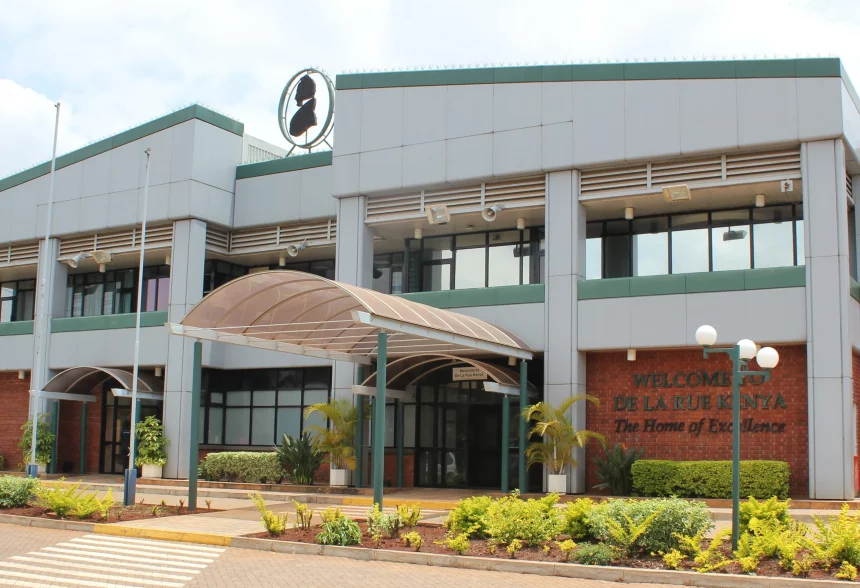Banknote printer De La Rue has spent Sh2.7 billion (£15.1 million) to lay off staff, pay lawyers and write off its assets as it closes down operations at its Nairobi unit due to low currency and cheques printing business.
The multinational firm, which has been printing notes for Kenya through a local joint venture that is 40 percent owned by the Kenyan government, says in the latest trading update that it has now fully closed its notes printing line and is at the tail end of shutting down the cheques business.
The company, operating in Kenya as De La Rue Kenya EPZ Limited, had about 300 employees.
It says in the trading update that it has used £5.5 million (Sh977.1 million) on redundancy charges, £4.9 million (Sh870.5 million) to write off property, plant and equipment and £2 million (Sh355.3 million) to impair inventory.
“As a result of the review of the business in Kenya, an exceptional charge of £12.6 million was made in the financial year 2023,” says De La Rue.
The firm also incurred £2.5 million (Sh444.15 million) charge for redundancy and legal fees in relation to restructuring initiatives in both the currency and authentication divisions to right-size for future operations.
The expenses, covering the financial year that ended March 25, 2023, came on the back of De La Rue having announced in January that it would shut down its operations in Kenya owing to a confirmation from the Central Bank of Kenya (CBK) that there would be no offers for printing bank notes for at least the next 12 months.
De La Rue says its operations in the authentication division that handles products such as bank cards, identification cards, certificates and cheques are also in the process of winding down.
The costs associated with shutting down its operations in the country saw De La Rue Kenya post a £7.3 million (Sh1.29 billion) net loss compared with £2.2 million (Sh389.9 million) net profit a year earlier.
The Treasury, with a 40 percent stake it acquired at £5 million (Sh886.2 million) in 2019, will take a £2.9 million (Sh513.97 million) loss compared with £0.9 million (Sh159.5 million) profit it enjoyed a year earlier.
Revenue from the Kenya operations fell by 45 percent from £30.5 million (Sh5.41 billion) to £16.8 million (Sh2.98 billion), pointing to the impact of reduced note printing and authentication business.
De La Rue late 2018 won an £85 million (Sh15.1 billion) tender to design and manufacture Kenya’s new currency generation notes as the country moved to remove the faces of individuals from its currency.
CBK disclosures show that currency production costs, which include ordering, printing, minting, freight, insurance and handling expenses, hit Sh2.39 billion in the financial year ended June 2022 compared with Sh2.09 billion the previous year.
The winding down of Kenyan operations means De La Rue will now be left with three banknote sites — UK, Malta and Sri Lanka — down from four at the beginning of the year and five in 2020, highlighting the declining demand for banknotes globally as digital transactions gain traction.
The firm has been carrying out substantial expansion in its Malta facility, including investing in a new vault by 2025.
De La Rue Group CEO Clive Vacher says the Malta unit has the “potential to replace the Kenya capacity if market conditions are favourable.”
De La Rue has been working in Kenya for over 25 years from where it served other markets such as Tanzania, Uganda, Zambia and Rwanda.
The 200-year-old company makes about a third of all of the banknotes in the world but it is facing increased exposure to the rising popularity of digital payments.
The winding down of operations in Kenya is amid a Sh1.1 billion tax it has to pay the Kenya Revenue Authority (KRA) after it in January lost a court case related to taxes it paid on revenues earned in Kenya between 2013 and 2017.
The firm had said in January it was “disappointed with the [High Court] ruling” and that its Kenyan subsidiary was preparing an appeal.




